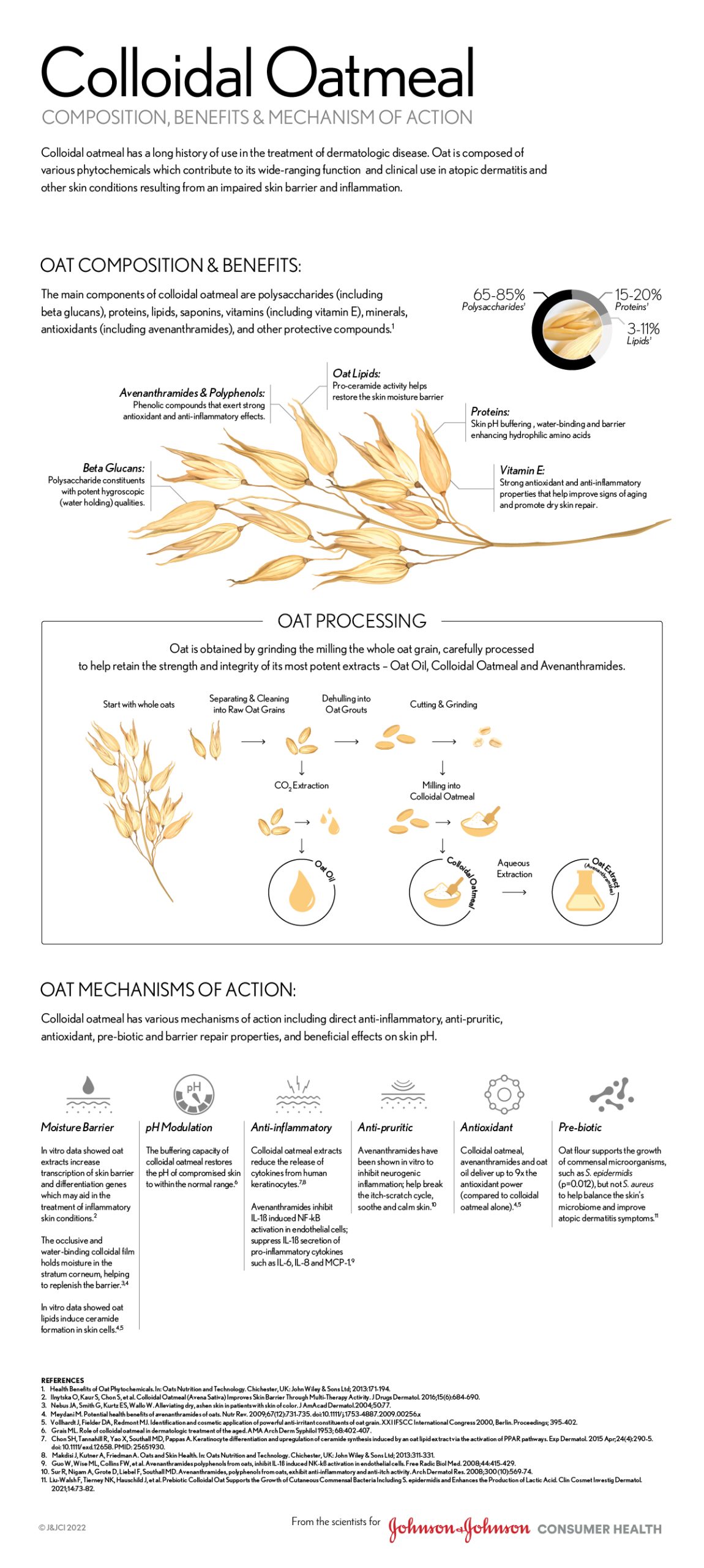Colloidal oatmeal has a long history of use in the treatment of dermatologic disease. Oat is composed of various phytochemicals which contribute to its wide-ranging function and clinical use in atopic dermatitis and other skin conditions resulting from an impaired skin barrier and inflammation.
OAT COMPOSITION & BENEFITS
The main components of colloidal oatmeal are polysaccharides (including beta glucans), proteins, lipids, saponins, vitamins (including vitamin E), minerals, antioxidants (including avenanthramides), and other protective compounds.1
Beta Glucans:
Polysaccharide constituents with potent hygroscopic (water holding) qualities
Avenanthramides & Polyphenols:
Phenolic compounds that exert strong antioxidant and anti-inflammatory effects.
Oat Lipids:
Pro-ceramide activity helps restore the skin moisture barrier
Proteins:
Skin pH buffering, water-binding and barrier enhancing hydrophilic amino acids
Vitamin E:
Strong antioxidant and anti-inflammatory properties that help improve signs of aging and promote dry skin repair.
OAT PROCESSING
Oat is obtained by grinding the milling the whole oat grain, carefully processed to help retain the strength and integrity of its most potent extracts – Oat Oil, Colloidal Oatmeal and Avenanthramides.
OAT MECHANISMS OF ACTION
Colloidal oatmeal has various mechanisms of action including direct anti-inflammatory, anti-pruritic, antioxidant, pre-biotic and barrier repair properties, and beneficial effects on skin pH.
Moisture Barrier
-
- In vitro data showed oat extracts increase transcription of skin barrier and differentiation genes which may aid in the treatment of inflammatory skin conditions.2
- The occlusive and water-binding colloidal film holds moisture in the stratum corneum, helping to replenish the barrier.3,4
- In vitro data showed oat lipids induce ceramide formation in skin cells.4,5
pH Modulation
The buffering capacity of colloidal oatmeal restores the pH of compromised skin to within the normal range.6
Anti-inflammatory
-
- Colloidal oatmeal extracts reduce the release of cytokines from human keratinocytes.7,8
-
- Avenanthramides inhibit IL-1ß induced NF-kB activation in endothelial cells; suppress IL-1ß secretion of pro-inflammatory cytokines such as IL-6, IL-8 and MCP-1.9
Anti-pruritic
Avenanthramides have been shown in vitro to inhibit neurogenic inflammation; help break the itch-scratch cycle, soothe and calm skin.10
Antioxidant
Colloidal oatmeal, avenanthramides and oat oil deliver up to 9x the antioxidant power (compared to colloidal oatmeal alone).4,5
Pre-biotic
Oat flour supports the growth of commensal microorganisms, such as S. epidermidis (p=0.012), but not S. aureus to help balance the skin’s microbiome and improve atopic dermatitis symptoms.11

REFERENCES
-
- Health Benefits of Oat Phytochemicals. In: Oats Nutrition and Technology. Chichester, UK: John Wiley & Sons Ltd; 2013:171-194.
- Ilnytska O, Kaur S, Chon S, et al. Colloidal Oatmeal (Avena Sativa) Improves Skin Barrier Through Multi-Therapy Activity. J Drugs Dermatol. 2016;15(6):684-690.
- Nebus JA, Smith G, Kurtz ES, Wallo W. Alleviating dry, ashen skin in patients with skin of color. J AmAcad Dermatol.2004;50:77.
- Meydani M. Potential health benefits of avenanthramides of oats. Nutr Rev. 2009;67(12):731-735. doi:10.1111/j.1753-4887.2009.00256.x
- Vollhardt J, Fielder DA, Redmont MJ. Identification and cosmetic application of powerful anti-irritant constituents of oat grain. XXI IFSCC International Congress 2000, Berlin. Proceedings; 395-402.
- Grais ML. Role of colloidal oatmeal in dermatologic treatment of the aged. AMA Arch Derm Syphilol 1953; 68:402-407.
- Chon SH, Tannahill R, Yao X, Southall MD, Pappas A. Keratinocyte differentiation and upregulation of ceramide synthesis induced by an oat lipid extract via the activation of PPAR pathways. Exp Dermatol. 2015 Apr;24(4):290-5. doi: 10.1111/exd.12658. PMID: 25651930.
- Makdisi J, Kutner A, Friedman A. Oats and Skin Health. In: Oats Nutrition and Technology. Chichester, UK: John Wiley & Sons Ltd; 2013:311-331.
Did you enjoy this Skincare Monday post? You can find more on our OTC Resource Center.

